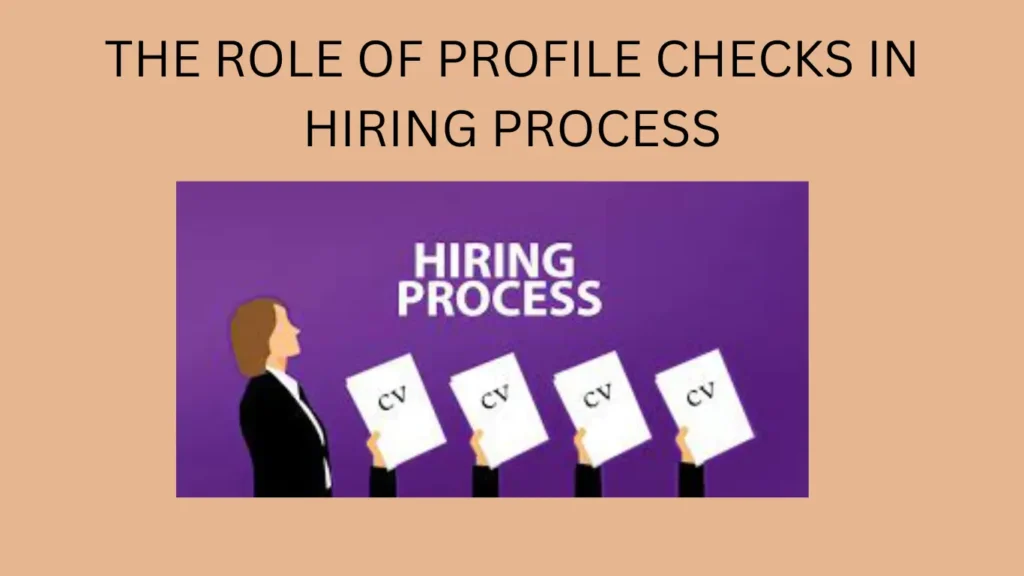For any organization to survive, hiring the appropriate staff is essential. A bad hiring procedure can cost a business money, time, and reputation. As a result, profile checks are crucial to the employment procedure. By ensuring that a candidate’s background is confirmed before making an employment offer, profile checks help organizations lower the chance of selecting the incorrect person. It is true that organizations have the ability to do several types of profile checks, such as drug tests, background checks, reference checks, social media checks, and criminal background checks. Every one of these investigations yields important details regarding a candidate’s history and appropriateness for a certain position. Organizations can benefit greatly from profile checks in a number of ways, such as the capacity to make knowledgeable recruiting decisions, confirm the veracity of information provided by candidates, and protect the company’s brand. Additionally, profile checks might lessen the possibility of hiring unfit applicants who might cause issues for the company. However, when performing these checks, businesses must make sure they are compliant with both federal and state laws. It is imperative to obtain written consent from candidates and refrain from discriminating on the basis of protected characteristics, including but not limited to race, color, religion, sex, national origin, age, or handicap. In order to perform effective profile checks, companies must create a clear policy that outlines the kind of checks that will be performed, who will be assigned to perform the checks, and how the information gathered will be used. It’s equally crucial to use reliable sources and stick to a consistent procedure when performing these tests.
Importance of Profile Checks
In order to help businesses make educated recruiting selections, profile checks are essential to the hiring process. Through profile checks, employers can confirm the veracity of the data submitted by applicants, including employment history, educational background, and credentials. Furthermore, criminal histories and prior disciplinary acts that can endanger the business or other employees can be uncovered by profile checks.
Types of Profile Checks
Companies can perform a variety of profile checks on candidates when they are hiring. Among them are:
Background checks: A candidate’s work history, educational background, criminal record, credit history, and other pertinent data can all be verified with these checks.
Reference checks: In order to learn more about a candidate’s character, work ethic, and prior performance, these checks entail getting in touch with the candidate’s prior employers or personal references.
Social media checks: Examining a candidate’s social media accounts provides information on their personality, hobbies, and conduct.
Benefits of Profile Checks
Reducing risk is one of the biggest benefits of profile checks throughout the employment process. By performing profile checks, companies might uncover potential hazards related to candidates, such as a criminal past or prior disciplinary proceedings. Employers are able to make better hiring decisions because to this information, which may produce better outcomes. In addition, profile checks assist hiring managers make more informed selections by providing them with more insight about the character and employment history of candidates.Employers who choose to hire applicants with a strong character and track record of achievement can increase retention and decrease turnover. To sum up, profile checks are essential for companies to lower risk, choose wisely when employing new employees, and raise employee retention rates.
Legal Considerations
Companies conducting profile checks must abide by all applicable laws and rules, including state-specific employment statutes and the Fair Credit Reporting Act (FCRA). Companies also need to make sure that they don’t exclude people from consideration on the basis of protected traits including national origin, age, handicap, sex, race, color, or religion.
Conducting Effective Profile Checks (Tips)
For businesses to minimize hiring risks and make well-informed hiring decisions, conducting efficient profile checks is essential. These pointers should be followed by businesses to guarantee that profile checks are carried out successfully:
First things first, create a standardized procedure for performing profile checks. This helps to avoid any possible discrimination allegations by guaranteeing that every candidate is examined equally.
Second, before doing any profile checks, get candidates’ signed consent. This affords openness, respects the candidate’s privacy, and shields the business from any legal problems.
Thirdly, while performing profile checks, turn to reliable sources like background check companies or business contacts. This guarantees the accuracy and dependability of the data acquired.
Lastly, get in touch with references to learn more about a candidate’s background in the workplace and overall personality. This can offer insightful information that other sources might not be able to deliver.
For further Inquires Contact Us
FAQs
- Q: What are profile checks in the hiring process?
A: Profile checks involve verifying a candidate’s background, qualifications, and suitability for a job through various screening methods. - Q: How do profile checks enhance the hiring process?
A: Profile checks help employers ensure they are hiring qualified candidates, reduce the risk of hiring unsuitable candidates, and protect the company’s reputation. - Q: What information is typically included in a profile check?
A: Profile checks can include verification of education, employment history, professional licenses, certifications, and criminal background. - Q: Are profile checks mandatory in the hiring process?
A: While not mandatory, profile checks are highly recommended as they help employers make informed hiring decisions and reduce the risk of hiring unqualified or dishonest employees. - Q: How can employers conduct effective profile checks?
A: Employers can use third-party screening services or conduct checks internally, but it’s important to ensure compliance with applicable laws and regulations.
